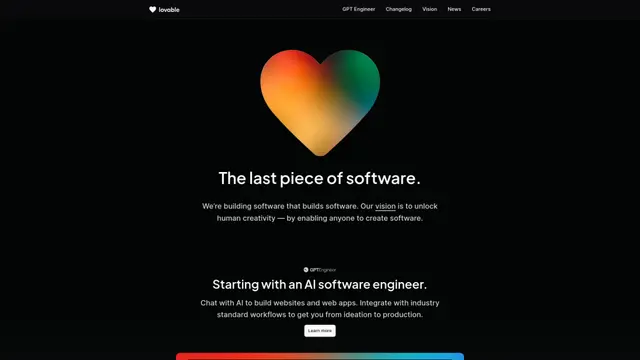Genesis
Genesis è una piattaforma di simulazione basata sulla fisica completa che combina AI generativa con motori fisici universali per abilitare robotica e apprendimento AI embodied di uso generale attraverso la generazione automatizzata di ambienti e acquisizione di abilità.
https://github.com/Genesis-Embodied-AI/Genesis?tab=readme-ov-file&utm_source=aipure

Informazioni sul Prodotto
Aggiornato:Nov 16, 2025
Cos'è Genesis
Genesis è una piattaforma fisica innovativa progettata per applicazioni di Robotica, AI Embodied e AI Fisica che integra più tecnologie all'avanguardia in un framework unificato. Alla sua base, è costruita come un motore fisico universale che è stato riprogettato da zero, offrendo un ambiente di simulazione leggero, ultra-veloce e intuitivo. La piattaforma si distingue per la sua capacità di gestire vari risolutori fisici, supportare diversi materiali e fenomeni fisici, e generare dati di addestramento automatizzati attraverso il suo framework generativo. Attualmente disponibile come software open-source per il suo motore fisico e i componenti della piattaforma di simulazione, Genesis mira a rendere la ricerca in robotica più accessibile mentre spinge i confini della fedeltà della simulazione fisica.
Caratteristiche principali di Genesis
Genesis è una piattaforma di simulazione fisica completa progettata per applicazioni di robotica e intelligenza artificiale incarnata. Combina un motore fisico universale, capacità di simulazione rapida, rendering fotorealistico e funzionalità di intelligenza artificiale generativa. La piattaforma si distingue per la sua capacità di simulare vari materiali e fenomeni fisici, offrendo al contempo compatibilità multipiattaforma, alte prestazioni (fino a 43 milioni di FPS) e un'interfaccia Python intuitiva. Integra più risolutori fisici e supporta un'ampia gamma di robot e modelli di materiali.
Motore Fisico Universale: Integra vari risolutori fisici (corpo rigido, MPM, SPH, FEM, PBD, fluido stabile) in un framework unificato capace di simulare materiali e fenomeni fisici diversi
Simulazione ad Alte Prestazioni: Offre una velocità di simulazione eccezionale di oltre 43 milioni di FPS quando simula un braccio robotico Franka su un singolo RTX 4090, rendendolo 430.000 volte più veloce del tempo reale
Compatibilità Multipiattaforma: Funziona nativamente su Linux, MacOS e Windows, supportando diversi backend di calcolo tra cui CPU, GPU Nvidia, GPU AMD e Apple Metal
Framework Generativo: Presenta un sistema modulare che può trasformare descrizioni in linguaggio naturale in varie modalità di dati, anche se attualmente solo il motore fisico è open-source
Casi d'uso di Genesis
Ricerca e Sviluppo in Robotica: Consente a ricercatori e sviluppatori di testare e convalidare i comportamenti dei robot in un ambiente di simulazione fisica altamente accurato prima del dispiegamento nel mondo reale
Simulazione della Scienza dei Materiali: Supporta la simulazione di vari materiali, inclusi liquidi, gas, oggetti deformabili e materiali granulari per scopi di ricerca e test
Ambiente di Addestramento per AI: Fornisce una piattaforma per addestrare agenti di intelligenza artificiale incarnata con interazioni fisiche realistiche e condizioni ambientali diverse
Test di Automazione Industriale: Permette il test di scenari complessi di automazione e sistemi robotici in un ambiente virtuale con alta fedeltà fisica
Vantaggi
Velocità e prestazioni di simulazione eccezionali
Capacità di simulazione fisica complete
Interfaccia Python intuitiva
Compatibilità multipiattaforma
Svantaggi
Funzionalità generative non ancora disponibili nella versione open-source
Richiede hardware di alta gamma per prestazioni ottimali
Ancora in fase di sviluppo attivo con alcune funzionalità in attesa di rilascio
Come usare Genesis
Installa i prerequisiti: Installa Python versione 3.9 o superiore e PyTorch seguendo le istruzioni ufficiali di installazione di PyTorch da pytorch.org
Installa Genesis: Esegui 'pip install genesis-world' nel tuo terminale/prompt dei comandi per installare il pacchetto Genesis
Importa i moduli richiesti: Nel tuo script Python, importa i moduli di Genesis. Le importazioni esatte dipenderanno dalle funzionalità che desideri utilizzare (motore fisico, rendering, ecc.)
Configura l'ambiente di simulazione: Crea un ambiente di simulazione utilizzando il motore fisico di Genesis. Puoi caricare modelli di robot utilizzando formati di file supportati come MJCF (.xml), URDF, .obj, .glb, .ply o .stl
Configura i parametri fisici: Configura i parametri fisici per la tua simulazione inclusi il tipo di risolutore (Corpo rigido, MPM, SPH, FEM, PBD o Fluido stabile) a seconda delle tue esigenze
Aggiungi oggetti e materiali: Aggiungi oggetti al tuo ambiente di simulazione e specifica le loro proprietà materiali. Genesis supporta vari materiali tra cui corpi rigidi, liquidi, gas, oggetti deformabili e materiali granulari
Configura il rendering: Se è necessaria la visualizzazione, configura le impostazioni di rendering. Genesis supporta sia il rendering basato su rasterizzazione che il ray-tracing per risultati fotorealistici
Esegui la simulazione: Esegui la tua simulazione. Genesis può funzionare a velocità molto elevate - fino a 43 milioni di FPS su hardware supportato (RTX 4090)
Accedi alla documentazione: Consulta la documentazione ufficiale su genesis-world.readthedocs.io per riferimenti API dettagliati e tutorial per funzionalità avanzate
Ottieni supporto: Utilizza GitHub Issues per segnalazioni di bug e richieste di funzionalità, o GitHub Discussions per domande generali e discussioni di idee
FAQ di Genesis
Genesis è una piattaforma di fisica completa progettata per applicazioni di robotica, intelligenza artificiale incarnata e intelligenza artificiale fisica di uso generale. Combina un motore fisico universale, una piattaforma di simulazione robotica user-friendly, un sistema di rendering fotorealistico e un motore di dati generativo che può trasformare descrizioni in linguaggio naturale in varie modalità di dati.
Articoli Correlati
Articoli Popolari

Strumenti di IA più popolari del 2025 | Aggiornamento 2026 di AIPURE
Feb 10, 2026

Moltbook AI: la prima rete sociale di agenti AI puri del 2026
Feb 5, 2026

ThumbnailCreator: Lo strumento di intelligenza artificiale che risolve lo stress delle miniature di YouTube (2026)
Jan 16, 2026

Occhiali Smart AI 2026: Una prospettiva software-first sul mercato dell'AI indossabile
Jan 7, 2026








